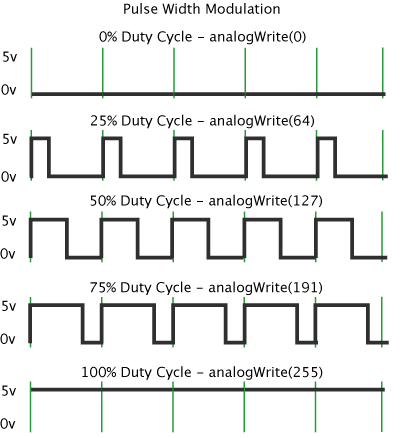Work I Completed
This week in mechatronics / robotics I completed the assigned work on pulse width modulation or PWM, which is the digital signal interface on Arduino. The task helped me to gain a basic understanding of PWM, but was not particularly challenging. The task gave a brief explanation of PWM - it is the way a digital on/off signal can imitate the changing voltage of an analog signal. Often electronics need variable voltages to function properly, and PWM is the way Arduinos do this. PWM changes the voltage by turning on and off at varying intervals creating a square wave when measured on an oscilloscope. The longer the signal is off, the lower the voltage and the longer it is on, the higher the voltage. The duration of on time between off periods is called the pulse width, hence the name pulse width modulation. Further, a period is the inverse of the PWM frequency, and duty cycle is the percentage of the period covered by the pulse width. An image detailing pulse width can be found below (from the task sheet).

PWM is a widespread technology, I best know it for powering my PC fans and pump, however there are endless uses. Digital signals would not have variable voltage without it, meaning it is a foundation for interactive digital devices and has had a profoundly positive impact on society. Learning how this technology works is not only beneficial to me in robotics, but is helpful for better understanding technology in general, and how our devices connect together.
Reflection
Did you give your best effort on this?
During this task I was not pushed to give my best effort seeing there was no real challenge. The guide was structured such that it gave you the code that made the solution run, and gave you the diagram of the circuit. There was no aspect of creating anything, I was simply guided to re-create what someone had already made. The code I submitted was taken directly from the guide, as I did not see much point in re-coding it when I had already seen the solution code. Next time I may look into the topic in more detail if the content is too simple. The task was called ‘PWM Intro’ so there could well be more to come.
Did this week’s activities help you learn more than others we’ve done?
Seeing this decreased difficulty made me less interested and therefore I retained less of the information provided. Maybe making the task more difficult on myself would increase my retention of the knowledge, however this takes up more time. This week I had considerably less time to do this task because of ilness, which is also a factor to the lower retention.
